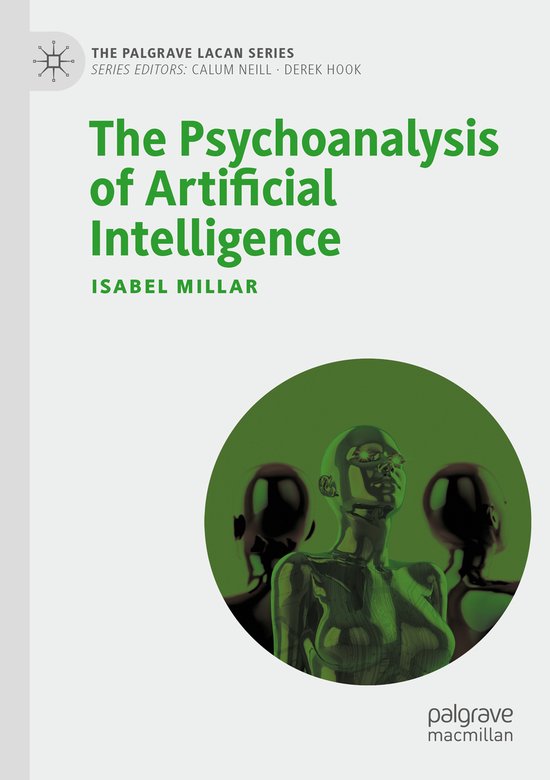
The Psychoanalysis of Artificial Intelligence
Through this figure and the medium of film, the author subverts Kant’s three Enlightenment questions and guides readers to transition from asking 'Does it think?' to 'Can it enjoy?' The book will appeal in particular to students and scholars of psychoanalysis, philosophy, film and media studies, critical theory, feminist theory and AI research.
“Boldly drawing on a vast range of academic disciplines orchestrated by an enviable psychoanalytic erudition and an original treatment of ‘sexbots’ as a central object for contemporary speculative and social investigation, Millar’s book asks a series of seminal and long-overdue questions, which are here to stay.”- Dr Lorenzo Chiesa, Newcastle University, UK
“In a stunning work of expansive intellectual power, Millar shifts the fundamental question concerning AI to the terrain of enjoyment. After Millar’s book, the question Does it enjoy? should be the starting point for any engagement with AI. It is simply an epochal book for understanding this engagement.”- Professor Todd McGowan, Department of English, University of Vermont, USA
“… Isabel Millar takes us on a fascinating journey across a vivid conceptual and figural landscape, and provides excellent proof that powerful, captivating theory is all about asking the right questions. The Psychoanalysis of Artificial Intelligence is both extremely timely and timeless in the way it constructs and tackles its object.”- Professor Alenka Zupančič, The European Graduate School and Slovenian Academy of Sciences and Arts
This book examines the crucial role of psychoanalysis in understanding what AI means for us as speaking, sexed subjects. Drawing on Lacanian theory and recent clinical developments it explores what philosophy and critical theory of AI has hitherto neglected: enjoyment. Through the reconceptualization of Intelligence, the Artificial Object and the Sexual Abyss the book outlines the Sexbot as a figure who exists on the boundary of psychoanalysis and AI. Through this figure and the medium of film, the author subverts Kant’s three Enlightenment questions and guides readers to transition from asking 'Does it think?' to 'Can it enjoy?' The book will appeal in particular to students and scholars of psychoanalysis, philosophy, film and media studies, critical theory, feminist theory and AI research.
Isabel Millar is a philosopher and psychoanalytic theorist. She is currently Research Fellow at the Centre for Critical Thought, University of Kent, UK.
This book examines the crucial role of psychoanalysis in understanding what AI means for us as speaking, sexed subjects. Drawing on Lacanian theory and recent clinical developments it explores what philosophy and critical theory of AI has hitherto neglected: enjoyment. Through the reconceptualization of Intelligence, the Artificial Object and the Sexual Abyss the book outlines the Sexbot as a figure who exists on the boundary of psychoanalysis and AI. Through this figure and the medium of film, the author subverts Kant’s three Enlightenment questions and guides readers to transition from asking 'Does it think?' to 'Can it enjoy?' The book will appeal in particular to students and scholars of psychoanalysis, philosophy, film and media studies, critical theory, feminist theory and AI research.
“Boldly drawing on a vast range of academic disciplines orchestrated by an enviable psychoanalytic erudition and an original treatment of ‘sexbots’ as a central object for contemporary speculative and social investigation, Millar’s book asks a series of seminal and long-overdue questions, which are here to stay.”- Dr Lorenzo Chiesa, Newcastle University, UK
“In a stunning work of expansive intellectual power, Millar shifts the fundamental question concerning AI to the terrain of enjoyment. After Millar’s book, the question Does it enjoy? should be the starting point for any engagement with AI. It is simply an epochal book for understanding this engagement.”- Professor Todd McGowan, Department of English, University of Vermont, USA
“… Isabel Millar takes us on a fascinating journey across a vivid conceptual and figural landscape, and provides excellent proof that powerful, captivating theory is all about asking the right questions. The Psychoanalysis of Artificial Intelligence is both extremely timely and timeless in the way it constructs and tackles its object.”- Professor Alenka Zupančič, The European Graduate School and Slovenian Academy of Sciences and Arts
This book examines the crucial role of psychoanalysis in understanding what AI means for us as speaking, sexed subjects. Drawing on Lacanian theory and recent clinical developments it explores what philosophy and critical theory of AI has hitherto neglected: enjoyment. Through the reconceptualization of Intelligence, the Artificial Object and the Sexual Abyss the book outlines the Sexbot as a figure who exists on the boundary of psychoanalysis and AI. Through this figure and the medium of film, the author subverts Kant’s three Enlightenment questions and guides readers to transition from asking 'Does it think?' to 'Can it enjoy?' The book will appeal in particular to students and scholars of psychoanalysis, philosophy, film and media studies, critical theory, feminist theory and AI research.
Isabel Millar is a philosopher and psychoanalytic theorist. She is currently Research Fellow at the Centre for Critical Thought, University of Kent, UK.
This book examines the crucial role of psychoanalysis in understanding what AI means for us as speaking, sexed subjects. Drawing on Lacanian theory and recent clinical developments it explores what philosophy and critical theory of AI has hitherto neglected: enjoyment. Through the reconceptualization of Intelligence, the Artificial Object and the Sexual Abyss the book outlines the Sexbot as a figure who exists on the boundary of psychoanalysis and AI. Through this figure and the medium of film, the author subverts Kant’s three Enlightenment questions and guides readers to transition from asking 'Does it think?' to 'Can it enjoy?' The book will appeal in particular to students and scholars of psychoanalysis, philosophy, film and media studies, critical theory, feminist theory and AI research.
| Auteur | | Isabel Millar |
| Taal | | Engels |
| Type | | Paperback |
| Categorie | | Mens & Maatschappij |